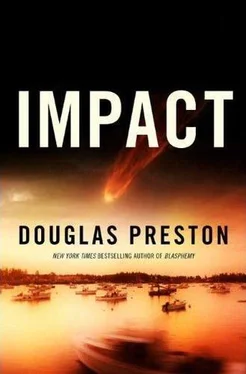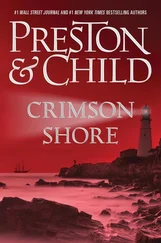Fighting the urge to sleep, he roused himself and eyed the mail. Depressingly slim responses to his job queries and applications. With an effort of will he scooped up the pile, tore open the first letter, and read the first line. Crumpling it into a ball he dropped it, opened the second, the third, the fourth.
The pile of paper at his feet grew.
The sixth and last letter stopped him dead. It was from the personnel office at CalTech, which administered NPF. At first he thought it might be his severance check, but when he opened it all he found was a letter. He scanned it in disbelief, his eye fixing on the first paragraph.
"After reviewing your employment records and the notice of termination for cause from your former supervisor at NPF, we have determined that you do not qualify for the severance package or unused leave compensation as outlined in your employment contract. We refer you to regulations 4.5.1 through 6 in the Handbook for Employees . . ."
He read it twice and tossed it on the table. This wasn't happening to him. They owed him two weeks' severance and two weeks' unused vacation: over eight grand. After six years of graduate school and eighty thousand dollars in student loans, here he was, crashing in a friend's basement apartment with less than five hundred dollars in his bank account, no job, no prospects, and a brick of maxed-out credit cards so thick he couldn't fit them all in his wallet. And now he couldn't even pay the back rent.
Slowly, inexorably, his anger built. Those bastards at NPF would pay. They owed him eight thousand dollars and he would get his money, one way or another. There had to be a way to get back at them.
The door opened and his roommate stood in the doorway. "Hey, Mark, I hate to be a jerk about that back rent, but I need the money. Like now."
Mark Corso arrived on the doorstep of his mother's old brownstone in Greenpoint, suitcases in hand, and rang the bell. The hangover was now full-blown, his eyeballs throbbed and he had a mouthful of paste. He hadn't been able to bring himself to call ahead. Inside, he could hear the shuffling of feet, the sound of locks being turned, and then his mother's quavering, uncertain voice.
"Who is it?"
"Me. Mark."
The final lock was turned and there was his mother--short, plump, iron-gray hair--her face lighting up. "Mark!" The arms went around him in a suffocating embrace, once, twice. She smelled of fresh pasta and her arms were patched with flour. "What have you got here, suitcases? Are you moving back in? Don't stand outside in the cold, come in! Are you here to stay or just a visit? You look so tired!" Another embrace, this one with a hint of tears.
She led her son, unresisting, into the parlor, and sat him down on the sofa.
"I'll make you your favorite, a Fluffernutter, you just stay right there and relax. You're so thin!"
"I'm fine, Mom."
Corso kicked off his shoes, stretched out on the sofa, clasped his hands behind his head, and stared up at the swirls of brushed stucco on the ceiling of his childhood home, thinking about the money NPF owed him. They couldn't deny him two weeks' severance just like that, without due process. And vacation time? He'd earned that. This was not right. He wondered if Derkweiler wasn't actively interfering with his efforts to find a new job--he hadn't even had a nibble. Incredible: here he was, sitting on the scientific discovery of a lifetime, unable to do anything with it, and being treated like shit by the establishment.
He had an ace in the hole: the hard drive. He wondered when they would miss it. An idea began to form. Years back, he recalled, a classified hard drive was misplaced at Los Alamos National Labs. It made the front page of The New York Times and led to the canning of the director and a bunch of scientists. Maybe the NPF drive needed to show up in some FBI office. The very fact it was outside the fence would cause a scandal. And who would get blamed? The mission director.
He sat up. That was it. Chaudry's career would be ruined if it became known someone in his unit had walked out with a classified hard drive. And Derkweiler would also be toast. He had them both by the short hairs. But there was no point in taking them down just for revenge. No . . . The threat of going to the FBI would only be his leverage. The stick, so to speak. The carrot was that he had a discovery that would make both of them famous, as well as himself--if they had the wisdom to reinstate him.
Now this was a plan. A quick phone call, nothing in writing. He would ask for nothing more than he deserved, something that Chaudry could do for him with the mere stroke of a pen--rehire him. With his discovery, all would be forgiven. He felt a mounting excitement. If Chaudry rejected his overture and reported the stolen drive, the man's career would be ruined. He'd never work with classified material again. Chaudry was smart, he was cool-headed, and above all he was ambitious. He would see the lay of the land.
Corso looked at his watch. Ten A.M. in New York, seven A.M. in California; Chaudry would still be at home. Perfect.
It was a matter of thirty seconds to get the home phone number off the Internet. Corso dialed it with slow deliberation, his heart hammering in his chest, while rehearsing his message. I have a classified NPF hard drive which contains all the high-res pictures of the planet. Freeman sent it to me before he was murdered. And on this drive is an image of an alien artifact. A machine. Trust me, you won't find it. But I did.
So here's the deal. Rehire me, you get the hard drive back, no one will know about the security breach--and we'll share credit for the greatest scientific discovery of all time. Refuse and I mail this drive to the FBI anonymously and your career is over. Finished. Nada. Remember what happened at Los Alamos?
The choice is yours. Think it over before doing anything stupid.
The phone began to ring. "Hello?" came Chaudry's cool voice.
43
Ford stepped out of the dinghy onto the rocks of Shark Island and breathed deeply of the salt air. He was glad to be on solid ground--the boat ride off shore, even in a calm ocean, had left him queasy. He was not, it must be admitted, a sailor. The brilliant summer day bathed the island in warm sunlight and the ocean lay shimmering from mainland to sea horizon. Seagulls cried and wheeled about above their heads, irritated at being disturbed from their habitual resting places on the shore rocks.
"Don't soil your Guccis," Abbey said.
He followed her to the top of the island, picking his way among rocks and bayberry bushes, and in a moment found himself at the edge of a small crater. The recent rains had washed clean the fractured bedrock at the bottom of the crater. In the middle of the bedrock, surrounded by cracks, Ford could see a perfect hole, about three inches in diameter.
He took a deep breath. What could have made an entry hole of three inches, pass through eight thousand miles of planet, and exit, making a hole ten feet across?
"We went to find a meteorite," said Abbey, "and that's what we found: a hole." She laughed ruefully.
Ford slipped a handheld radiation meter out of his gear bag. It registered normal background radiation only, about 0.05 millirem per hour. He took some pictures and got a GPS fix on the hole. Then he crouched and took a reading inside the hole itself, passing the RadMeter back and forth. It finally registered a slight uptick, to 0.1 millirem/hr.
"Am I going to have two-headed children?"
"Hardly."
He slipped into the crater and knelt, reaching inside the hole with his fingers and feeling around. The walls were smooth and glassy, just like the walls of the bigger hole in Cambodia. The extraterrestrial object--whatever it was--had bored a round cylinder in the rock as perfect as if it had been drilled. Cracks radiated outward, but there was little sign of violence and almost none of the usual explosive contact that occurs on impact--the hole was amazingly clean, the ground hardly disturbed. It was as if some unusual force had absorbed or canceled out the energy of the impact. The same thing must have happened at the far side of the Earth, in Cambodia. The exit hole should have been enormous, like that made by a bullet passing through a pumpkin, the shock wave alone blowing debris out the far end and leaving an active volcano or eruption of magma. But no. Both holes had somehow sealed themselves up at both ends. No magma, no eruption, just residual radiation. It made no sense. Anything large and fast enough to vaporize a hole in rock and actually drill through the Earth would have blown the island to smithereens.
Читать дальше












